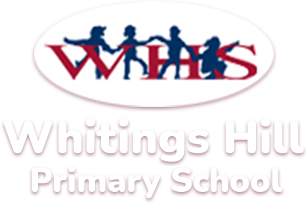English
‘The overarching aim for English in the national curriculum is to promote high standards of language and literacy by equipping pupils with a strong command of the spoken and written language, and to develop their love of literature through widespread reading for enjoyment.’
National Curriculum 2014
INTENT
At Whitings Hill Primary School, we aim to provide our children with an English Curriculum that is fun, motivating, interesting and most importantly purposeful. We strive to develop high standards of literacy through a stimulating and inspirational English Curriculum, where every child fosters a passion for English, has the opportunity to shine and reaches their full potential. At Whitings Hill, our broad and rich English curriculum aims to ensure that all our children:
-
Are exposed to high quality books to be used as stimuli for a creative and stimulating writing curriculum
-
See themselves as a writer
-
Are able to write and spell at age-appropriate levels and following age-related expectations
-
Make progress in line with their unique starting points upon entry into a new year group
-
Are exposed to a variety of engaging texts and picture books from a range of genres and authors every year
-
Develop skills in expressing themselves clearly and purposefully, using a varied vocabulary
-
Develop creativity in writing through experimenting with language and use the ideas and models of others to push their own thinking further
-
Develop an understanding of grammar and punctuation through exposure to meaningful learning experiences and vocabulary rich learning environments
-
Build strategies to become independent learners, such as through learning spelling patterns and self-editing
-
Take pride in their writing and present their work to a high standard
-
Gain a pen licence by the end of Year 4
-
Use success criteria to evaluate their own work in extended pieces of writing
IMPLEMENTATION
-
A consistent style/manner in teaching writing from Reception to Year 6, heavily modelling sentence development and thinking aloud as both a reader and a writer
-
All children to receive daily English lessons from Years 1 to 6
-
Children in EYFS and KS1 to have daily phonics sessions
-
A writing culture that values purpose, creativity and enjoyment
-
Weekly spelling sessions following the HeadStart spelling scheme
-
Spellings sent home and tested weekly
-
English working walls model a writing sequence
-
Key vocabulary to be displayed and shared, with word mats, dictionaries and thesauruses easily available to children
-
Weekly handwriting sessions following the Nelson Handwriting Scheme
-
Units of work to be planned that are thoughtfully sequenced
-
Teachers to plan writing opportunities into other areas of the curriculum
-
Teachers and TAs to model the writing process and discuss the decision and thought-making process aloud
-
Teachers adapt either the amount of adult input (including scaffolding), the task or the outcome expectations according to the learner
-
Editing, proofreading and re-drafting skills are modelled by adults and taught explicitly
-
Grammar and punctuation to be taught as part of daily English lessons
-
Children to be identified for additional support in handwriting where appropriate
-
Success criteria to be used by teachers in longer pieces of writing
-
Opportunities to write for real purposes and real audiences within the local community
-
To encourage and promote enjoyment, creativity and purposeful writing, events take place throughout the year These include, but are not limited to, World Book Day, themed writing weeks, drama workshops, class assemblies and visitors
-
Subject leader conducts learning walks, book looks and lesson observations throughout the year. These inform future areas for improvement and the impact of new initiatives.
IMPACT
-
Children enjoy writing and recognise its value, such as through sharing writing with others and seeing their work displayed
-
Children are proud of their writing and take care in their presentation
-
Children are familiar with different writing genres
-
Children write for a variety of different purposes and audiences
-
Children develop their ability to write sustained pieces
-
Writing across the curriculum is to a high standard
-
Skills progression is evident in books throughout the school
-
There is clear evidence of writing sequences in books
-
A range of genres are taught across the school, resulting in children being able to know and talk about literary styles, genres and authors
-
Marking is purposeful in identifying strengths and then promoting further thinking to improve children’s writing
-
Children respond to next step marking
-
Children use classroom resources to support their learning
-
Children’s presentation is to a high standard
-
Teachers moderate work in school and as part of inter-school meetings to ensure accurate judgements are being made
-
Rising Stars assessments are used from Years 1-5 to assess spelling, grammar and punctuation
-
Past SATs papers are used in Year 6 to assess spelling, grammar and punctuation
-
Half-termly pupil progress meetings ensure individuals and groups are making good progress and interventions are targeted and monitored
-
Interventions lead to increased proportions of children making good progress and achieving the expected level of development
-
Subject leader conducts learning walks, book looks and lesson observations throughout the year. These inform future areas for improvement and the impact of new initiatives.
-
Writing assessments are updated on Staff Shared drive half-termly and are analysed by the subject leader and deputy head
